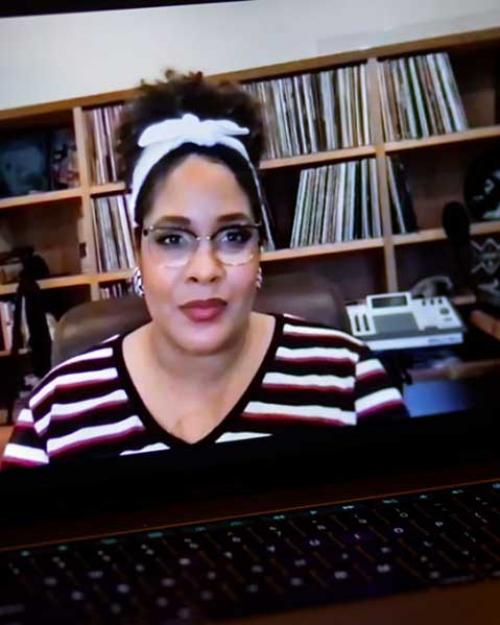As far as author Ijeoma Oluo is concerned, William Frederick “Buffalo Bill” Cody is hardly the American hero he’s made out to be.
“The only thing that really made him exceptional,” said Oluo, author of ““Mediocre: The Dangerous Legacy of White Male America,” released in December 2020, “was his ability to wreak carnage on people and animals, and what a good liar he was.”
Oluo, the featured speaker at the virtual Martin Luther King Jr. Commemorative Lecture, held March 1, said the white male in America has always enjoyed relatively unfettered passage – usually at the expense of others.
“[White men] always have power, regardless of what they put out into the world, regardless of their skill or talent,” she said. “But then there’s also an inverse of that, which is that … people who aren’t (white) men should only be able to accomplish so much. And the actual greatness that could arise is a threat to this norm.”
The annual event, which attracted approximately 400 community members on Zoom, was a conversation between Oluo and Ed Baptist, professor of history in the College of Arts and Sciences who focuses on the history of slavery in 19th-century America.
The event was sponsored by the Office of Spirituality and Meaning-Making (OSMM) and Cornell United Religious Work (CURW).
Following welcoming remarks from Marla Love, the Robert W. and Elizabeth C. Staley Interim Dean of Students, and Oliver Goodrich, associate dean for spirituality and meaning-making and CURW director, Baptist kicked off the conversation with Oluo, whose first book, “So You Want to Talk About Race” (2018), was a New York Times bestseller.
Oluo said she saw her literary debut as a sort of workbook.
“I always envisioned it being a thing that you would take and go back to over and over again, to use to springboard into other books on topics,” she said. “But it was something that helped you through a particular conversation, through a particular issue.”
Baptist asked Oluo why she wrote “Mediocre” and she attributed a particular emotion: frustration.
“I’d say people who write about race – especially people of color who write about issues of race – many of us have expressed this frustration with this fascination with individual bad deeds by white men,” she said, “or the individual white male psyche, that kind of supplants focus on the humanity of people who are harmed by white supremacist patriarchy in this country.”
Where her first book was a guide, of sorts, her latest effort has a sharper focus.
“‘Mediocre’ is a diagnostic – it’s really naming a thing that we don’t talk about enough,” she said. “It’s really aiming to be kind of opening the door to an area that I think we don’t focus on enough, and trying to create real change and real racial justice in this country.”
“Mediocre” questions the assumptions born of years of retelling the same old stories of supposed white male heroism.
“What I really wanted to do was to strip the myth away from a lot of it, and just lay it bare,” she said. “And not only to just show these instances for what they are, but to show the patterns and how often this happens, and how susceptible to it we are, and how it really infects the way that we think of manhood and heroism and leadership in this country.”
The glorification of the white male throughout history not only elevates his race, but also his sex. As a Black woman, she said, that creates two major barriers to overcome.
“I think I knew this on some level,” she said, “but I don’t think it’s ever been more clear to me, as a Black woman, that patriarchy and white supremacy cannot be unlinked in this country, because we’re talking about what upholds hyper-capitalism in the society.”
Other topics during the hourlong conversation:
• On how social media has changed the possibilities and the cost of activism: “I don’t think it’s creating necessarily new ways of connecting and organizing. But what happened before was you needed to at least have numbers you needed to have a group of people you could communicate with and organize with. … [Social media] allows us to take the way we work in organizing community and break down barriers of geography.”
• On the role of student activism (the Student Nonviolent Coordinating Committee was an important element of King’s efforts in the 1960s) in challenging white supremacist systems, patterns of behavior and education: “I think that there’s such amazing potential in student activism … It is really, really important that we recognize the ways in which institutions and governments are fighting to ensure that students don’t do that.”
• On the marginalization of queer identities in the public sphere: “We’re seeing this huge backlash against queer identities, queer studies and just in general bringing queerness into our discussions. We’re seeing this kind of recycling, religionization of anti-queerness that is being described as academic questioning … There’s also this generational pushback against queerness in general, that basically accuses queerness of stealing from gay and lesbian identities [and] from women in general.”
A recording of the conversation will be made available on the OSMM website.
Other sponsors of the MLK Lecture include the Office of Academic Diversity Initiatives, Black Students United, the Greater Ithaca Activity Center, the Gender Justice Advocacy Coalition, CU Tonight and the Tompkins County Public Library.




